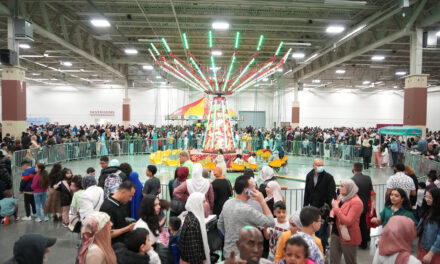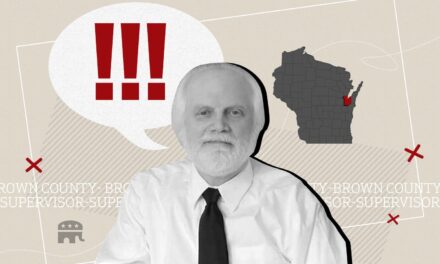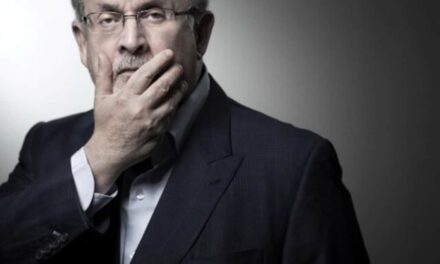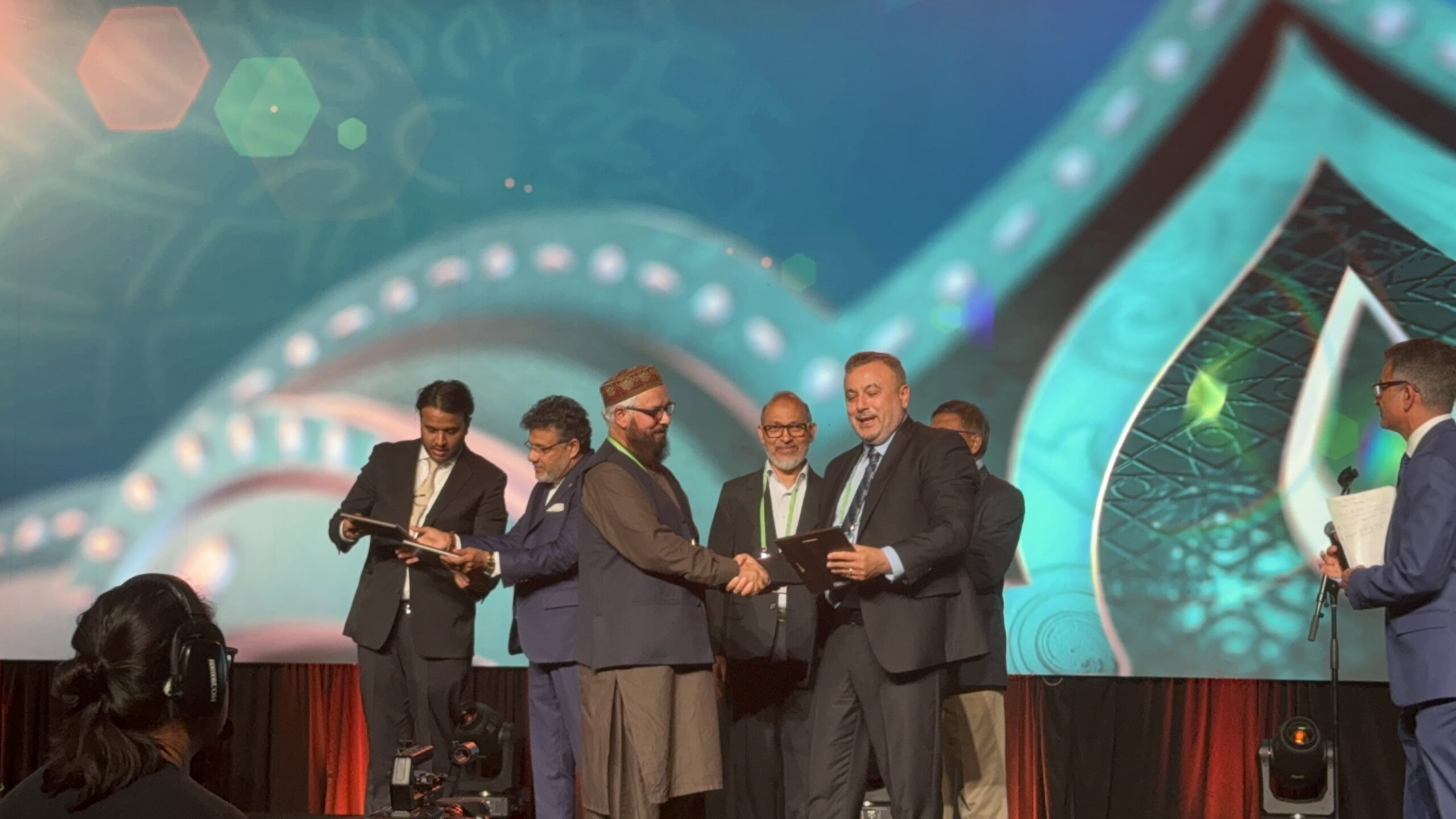
Photos courtesy of Masjid Al Quran
Hafiz Shafique (center) receives ISNA’s Third Place Green Award on behalf of Masjid Al-Qur’an.
Saiyid Masroor Shah, chair of the Islamic Society of North America’s Green Initiative, approached Masjid Al-Qur’an’s imam and religious director Hafiz Muhammad Shafique as they walked to a lecture at ISNA’s 61st Annual Convention in Dallas during Labor Day weekend.
“Congratulations,” Dr. Shah said, Imam Shafique recalled. “Masjid Al-Qur’an won an ISNA Green Award. Please be at the ceremony to receive it.”
The next day, in an auditorium packed to capacity at a convention with more than 20,000 registered attendees, Imam Shafique received ISNA’s Third Place Green Award on behalf of Masjid Al-Qur’an in Milwaukee. The mosque was recognized for its unique programs promoting environmental stewardship through education, energy conservation, agriculture, recycling and waste management, including reducing the use of plastics and Styrofoam.
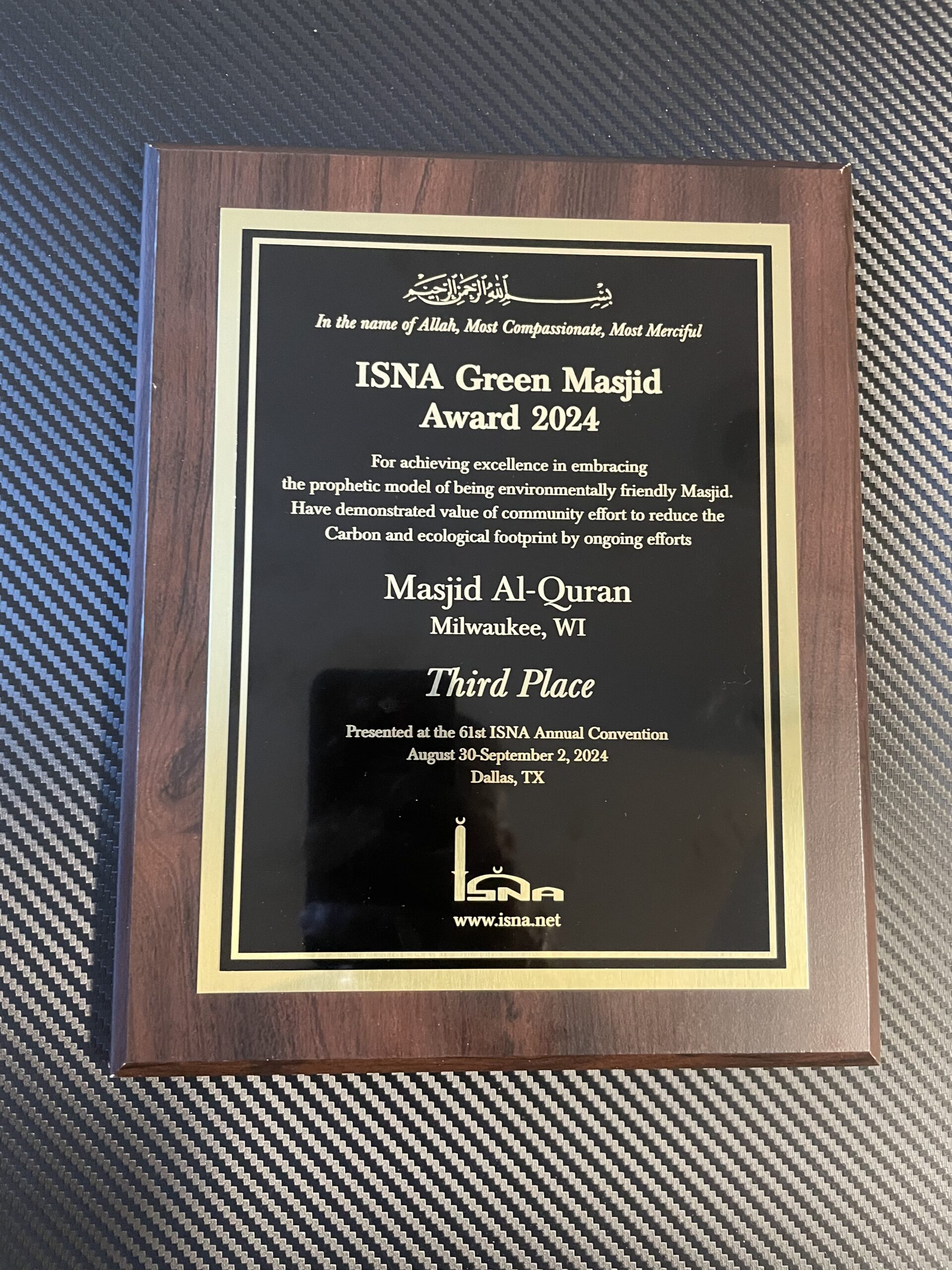
“It was a beautiful surprise,” Imam Shafique said about receiving the national award. “Winning this award is something that makes us proud of our community and volunteers. Their hard work was appreciated by such a big, esteemed organization.
“It’s also an opportunity to prioritize environmental stewardship. It is one of our important religious duties, to take care of God’s creation,” he said.
Another Wisconsin Muslim organization, Milwaukee Islamic Dawah Center, was among seven mosques/Islamic centers nationwide that applied for the ISNA 2024 Green Masjid Award. Applicants had to establish a “Green Team” and work to improve their environmental stewardship and education.
Interest in ISNA’s Green Initiative and Green Award is growing, Dr. Shah told the Wisconsin Muslim Journal. “I’m happy so many responded this year. Of course, I would like to see more and more involved.”
How they were scored
“Scoring was done in a very quantitative way,” Dr. Shah explained. “Participants answered about 25 questions and each answer was given a point score. The top scores won. That means they won for overall performance.”
Criteria included offering education, including khutbahs (sermons) about environmental responsibility and eco-friendly practices, such as the use of solar energy and the development of recycling and waste management programs.
Three independent committee members (not affiliated with applying organizations) scored each application blindly, he continued. “It happened that all three judges had the same winners in the same order.”
First place went to the Islamic Center of Evansville, Indiana. Second place was the Roswell Community Masjid in Georgia. Masjid Al-Qur’an of Milwaukee won third place.
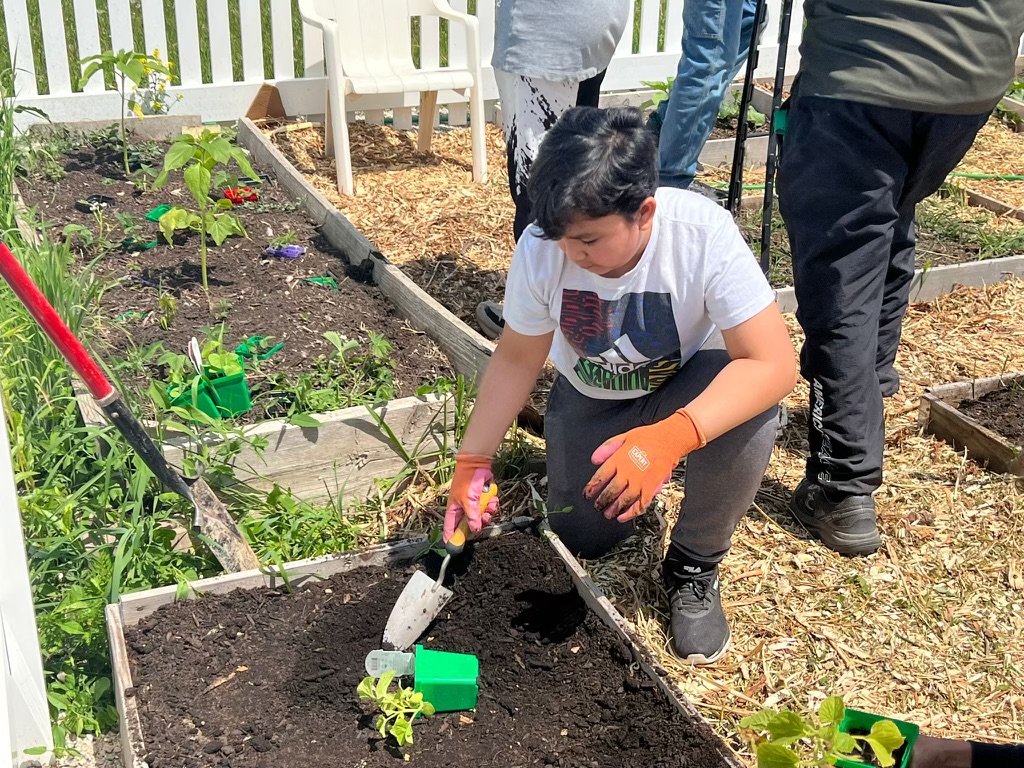
Al Quran summer school students learn how to plant and develop self-sustaining farms.
ISNA’s Green Initiative Celebrates 10 years
“Based upon the premise that Islam has ordained us to be the stewards and protectors of this planet, Muslims need to be an eco-friendly community,” ISNA’s website states. The Green Awards are part of that effort.
Since 2014, ISNA Green Initiative has worked to create awareness and provide guidance to help mosques and Islamic centers become better stewards of the earth, said Dr. Shah. “We need to recognize that as Muslims it’s our responsibility to take care of God’s creation. Being a national organization of Muslims, we decided we need to get involved in advocating for the environment.
The goals of ISNA’s Green Initiative are to:
- Raise awareness of issues of the protection and conservation of environment and the
catastrophic effects of climate change through various educational means, - Promote the practice of a “Green Ramadan” to reduce waste, conserve resources and reduce the use of products harmful to environment like plastic water bottles and Styrofoam
- Promote the use of Solar energy to reduce the use of fossil fuels,
- Develop standards to transform existing Masjid into environmentally friendly
places of worship and promote an eco-friendlier environment for Muslim communities at large - Develop standards for building masjids that meet the standards of green architecture, and
- Promote environmental social justice.
ISNA offers a Green Initiative Guidebook to those interested, Dr. Shah said.
“One other thing I want to mention—it is very important for people to think about putting solar panels in their mosques. When they do, they will realize how much cost saving results,” he said. “In partnership with the Environmental Protection Agency, we provide a guide specifically for Muslims, addressing mosques and Islamic schools, explaining how they can become more energy efficient.”
Under the Biden Administration, mosques and other organizations can get a 30% tax rebate on their solar panels,” Dr. Shah added.
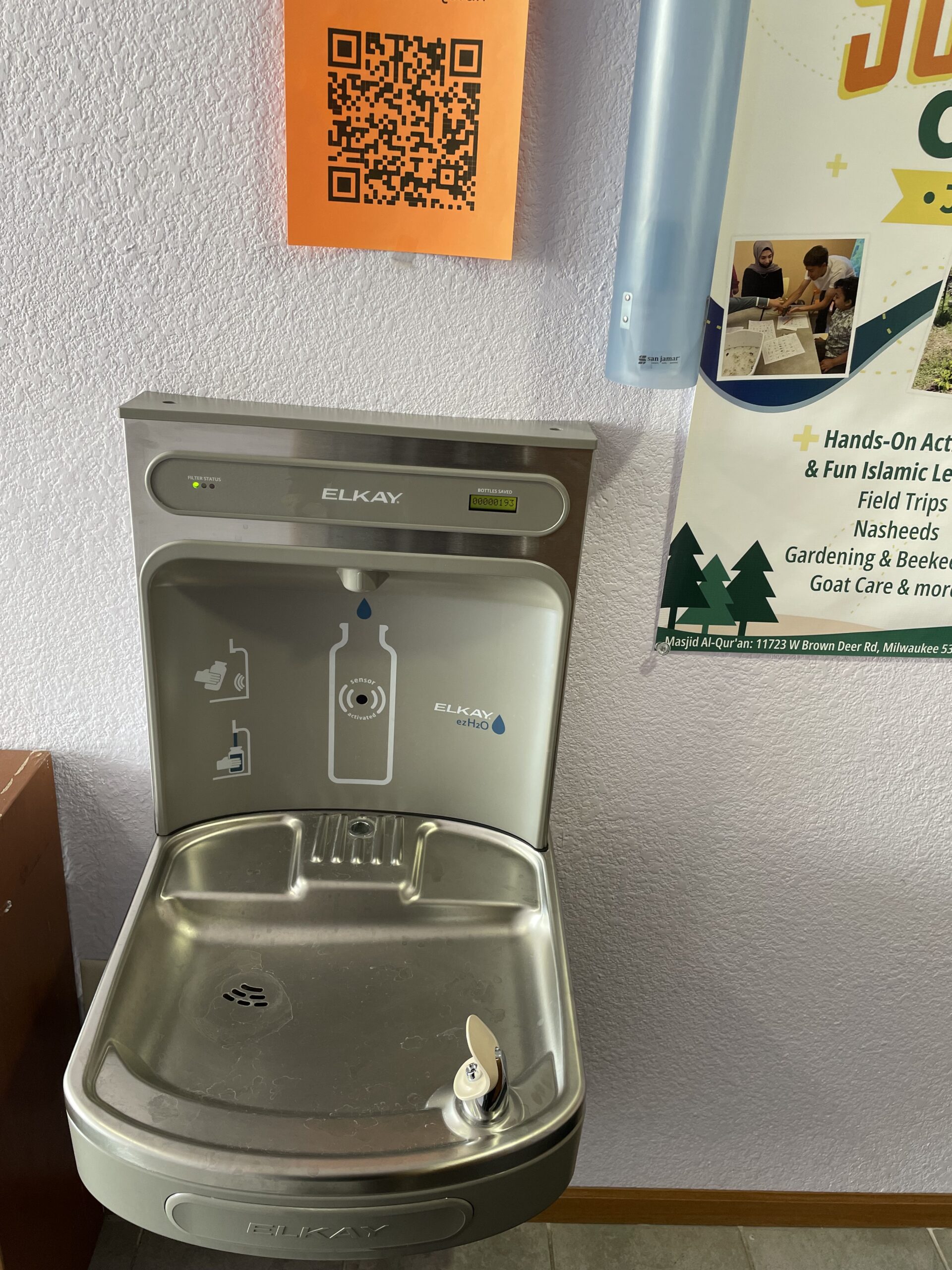
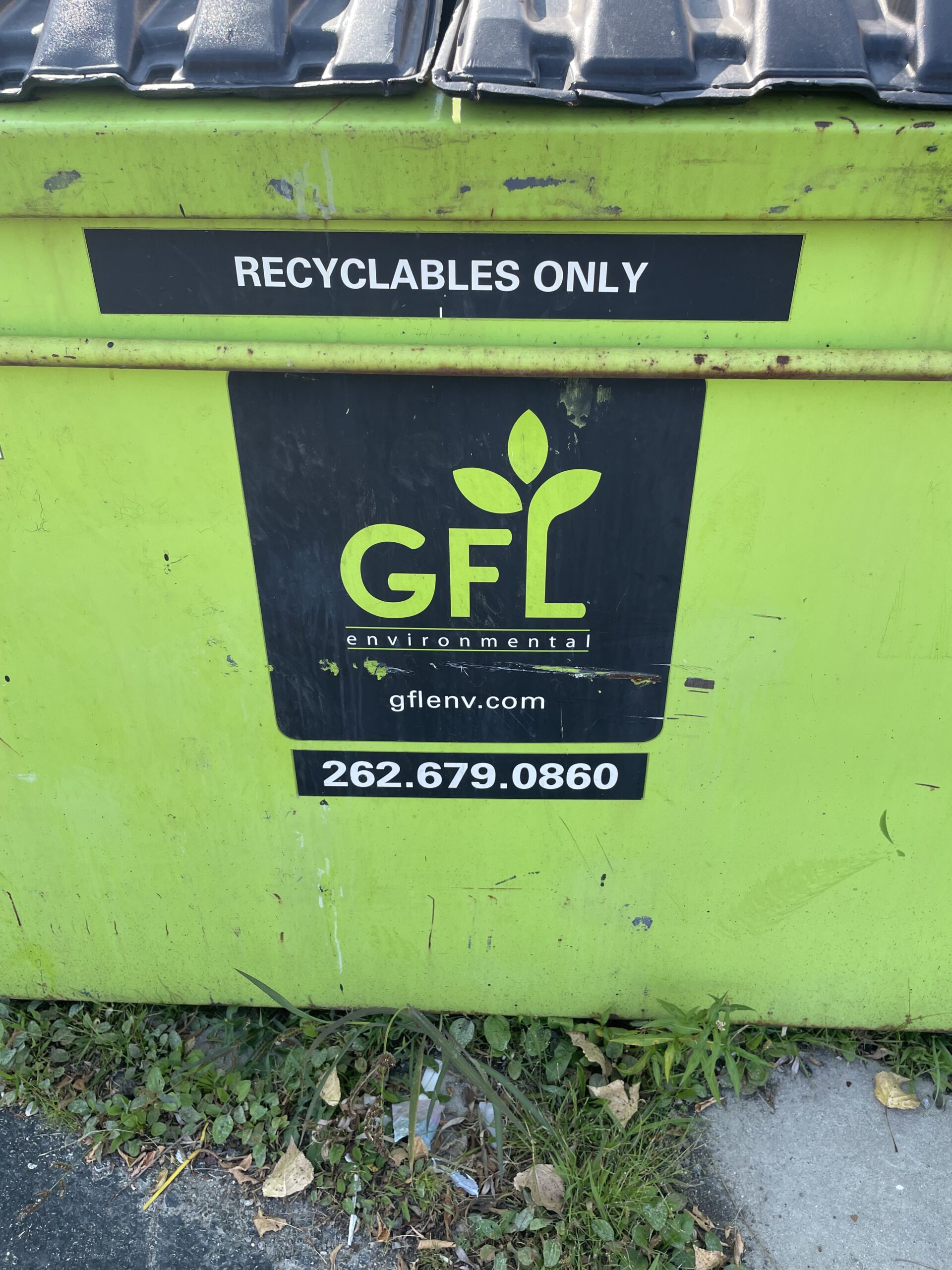
How Masjid Al-Quran became so eco-friendly
“Slowly, slowly,” over many years, Masjid Al-Qur’an has been working to be good stewards of God’s creation, Imam Shafique said. Community volunteers stepped up to the challenge. Luqman Bahi (Marcus Davis) of Milwaukee, Mariam Abu Baker of Milwaukee and Dr. Faiza Hashim of Franklin created a hands-on summer school program that teaches children and youth to care for farm animals, tend an organic vegetable garden, plant and harvest fruit trees and develop self-sustaining farming practices.
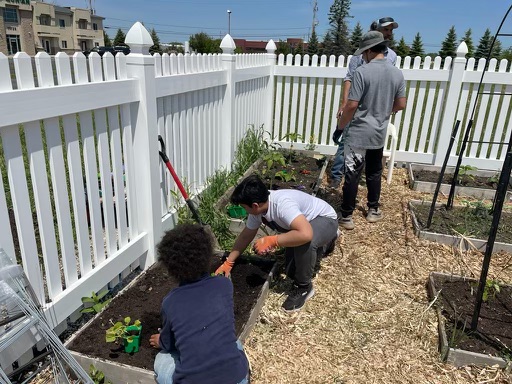
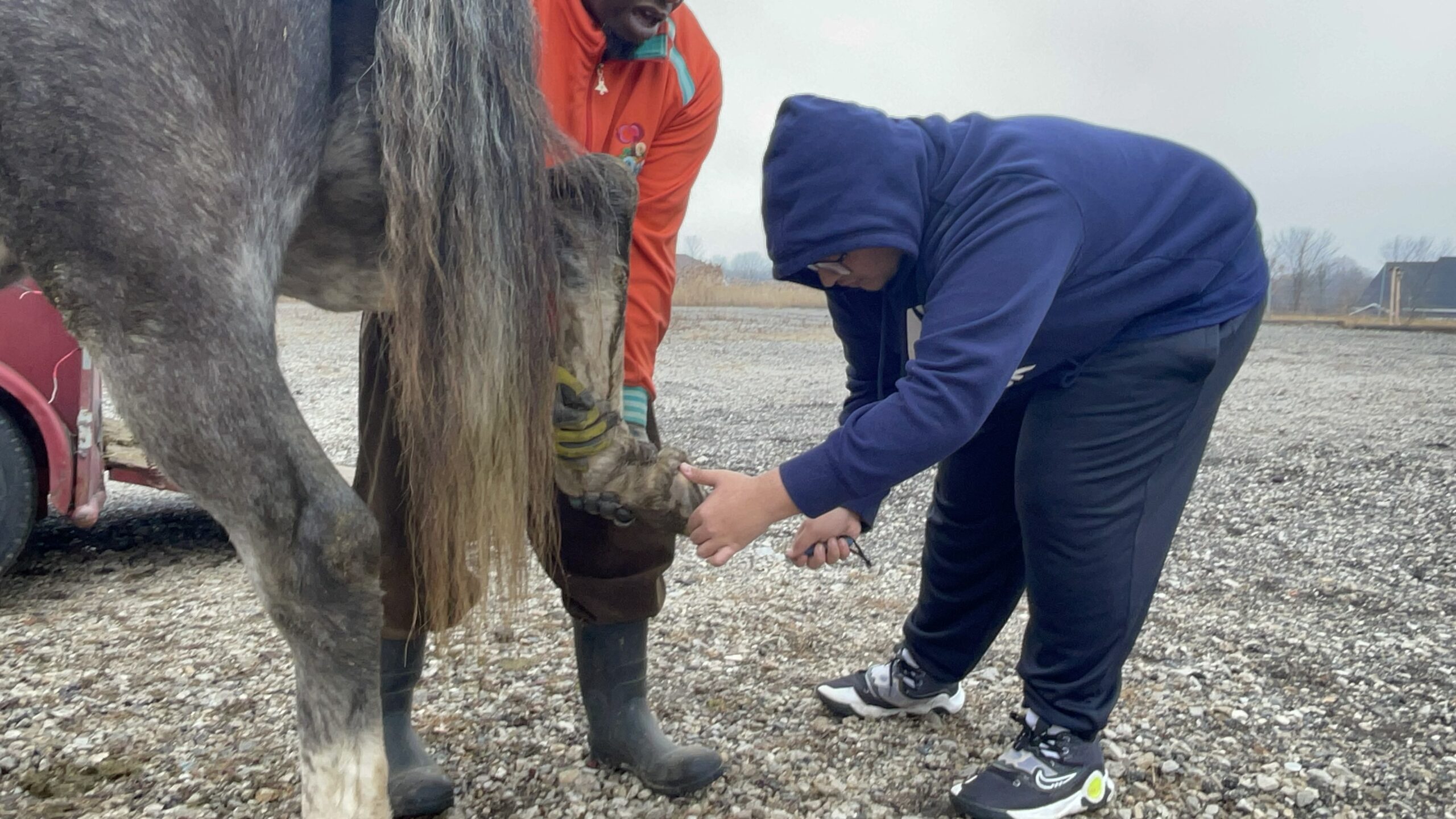
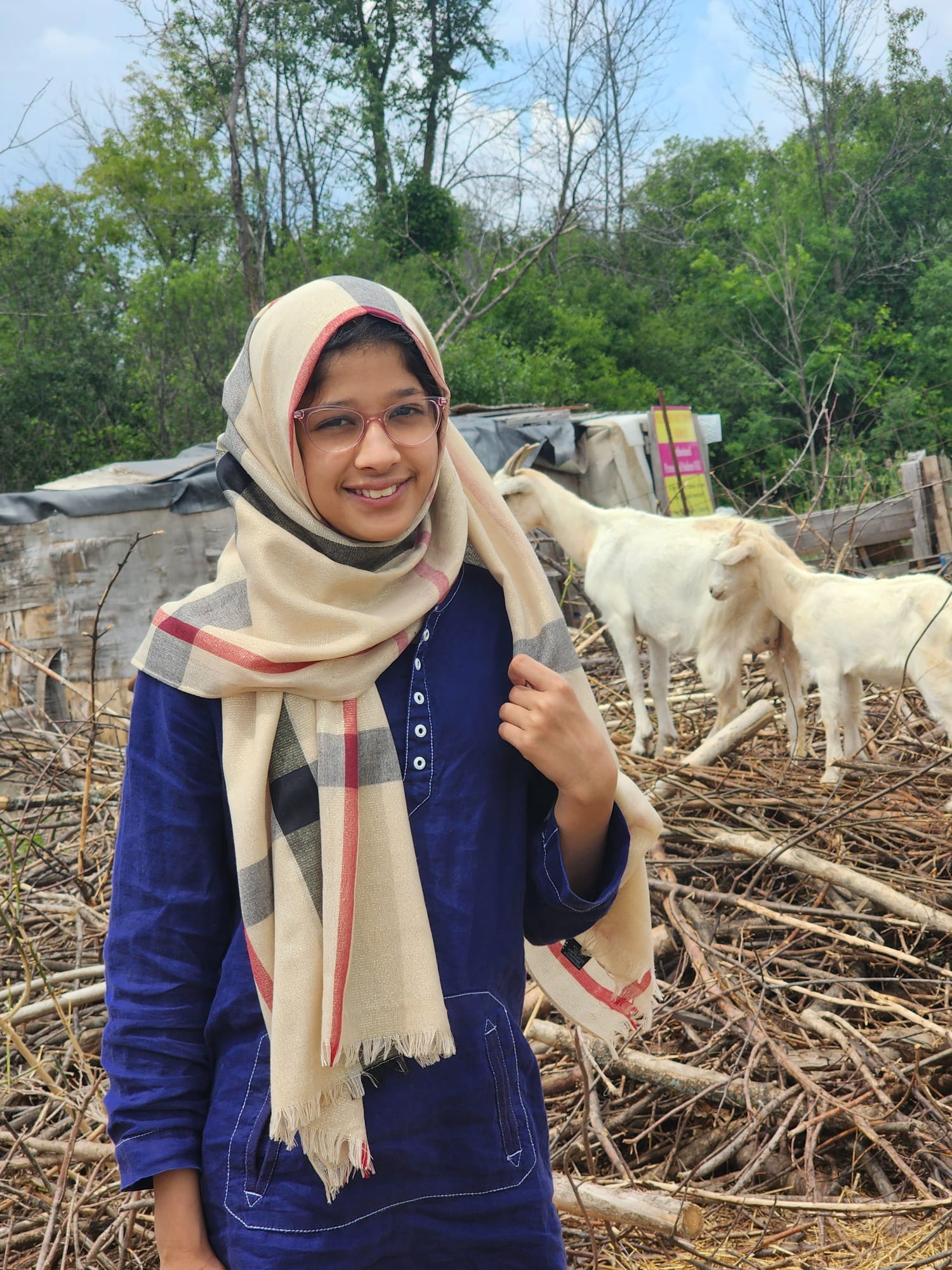
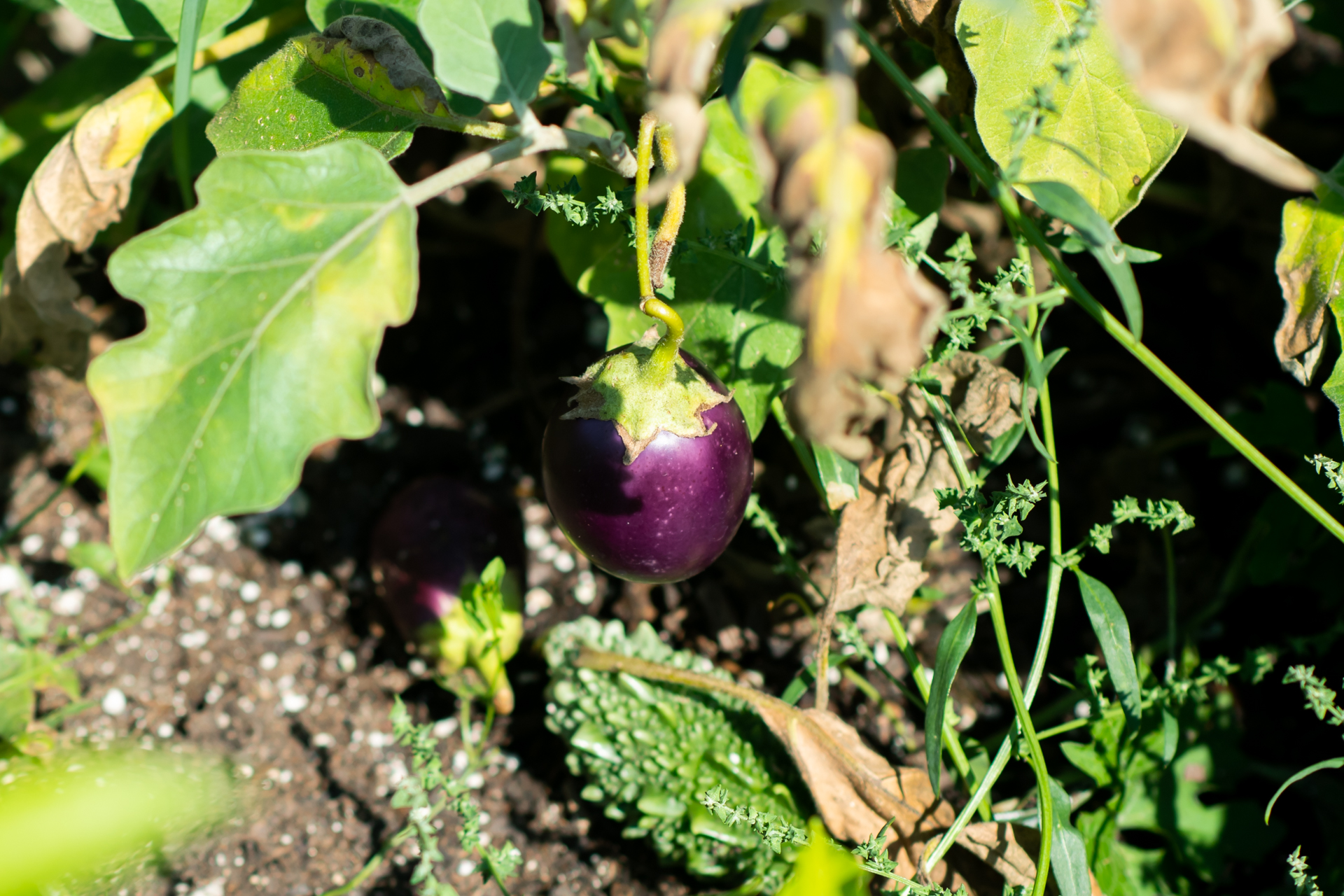
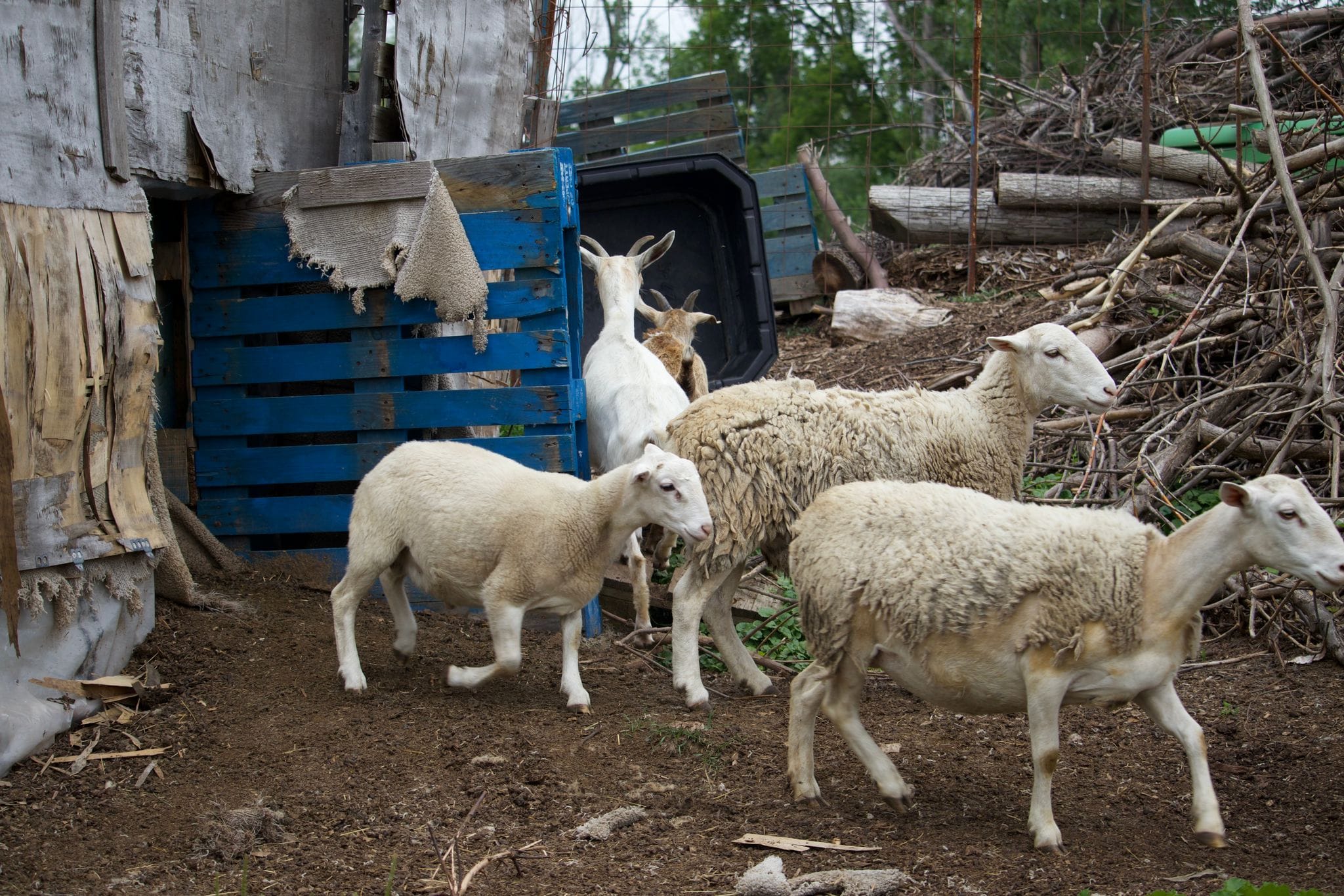

Shaimai Wu, called Abu Zakaria, brought bee-keeping skills he learned growing up in a Muslim family in China to Masjid Al-Qur’an. With support from Imam Shafique and the community, he established six beehives on the masjid’s grounds. The community now celebrates about three honey harvests each year. The hives also create opportunities to learn about bees’ critical role in the environment.
They also had help from Wisconsin Green Muslims, Imam Shafique said. Wisconsin Green Muslims is a statewide grassroots environmental justice group that connects faith, environmental justice, sustainability and healing through education and service, says its Facebook page.
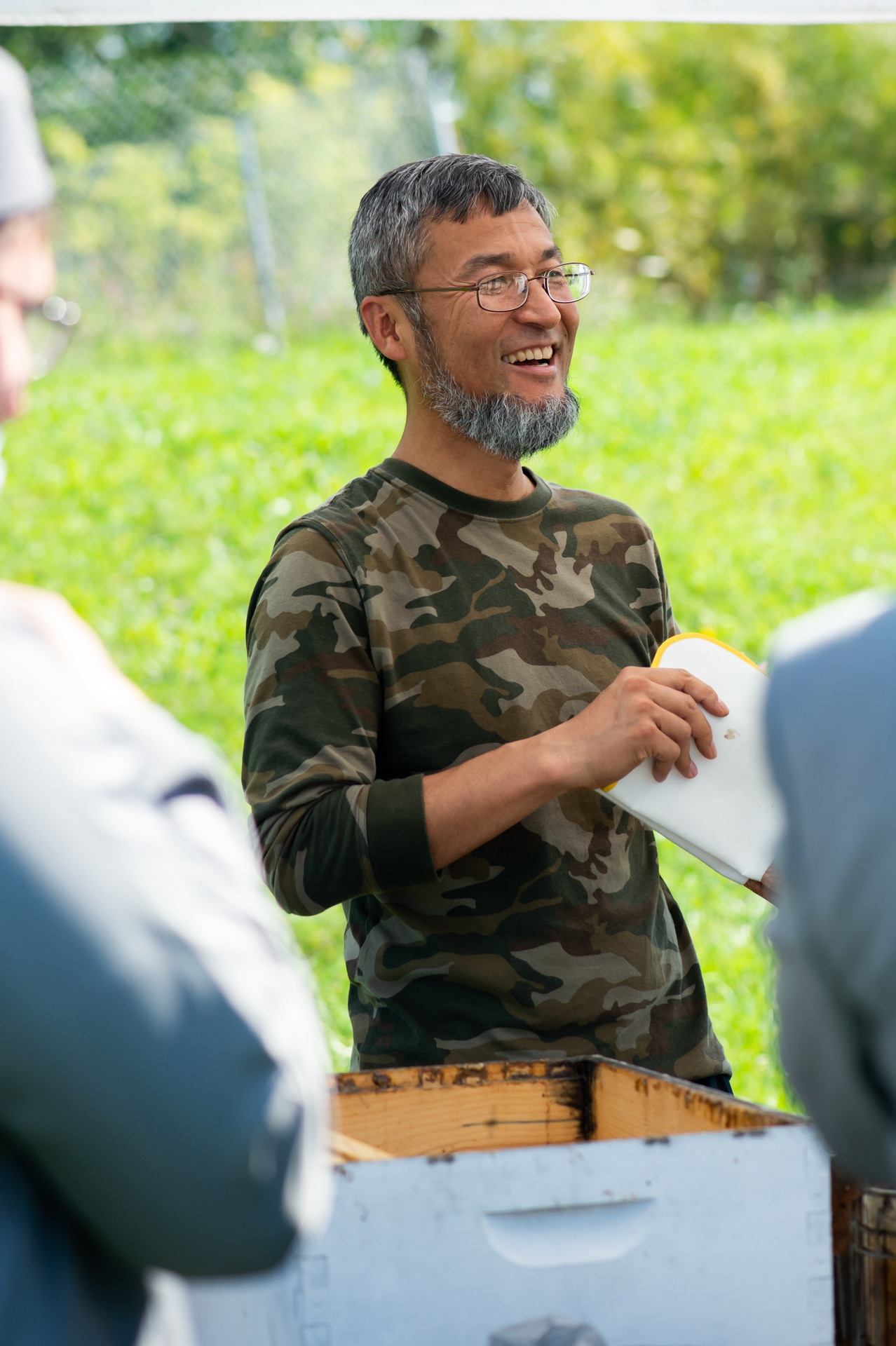
Shaimai Wu, Masjid Al-Qur’an’s beekeeeper
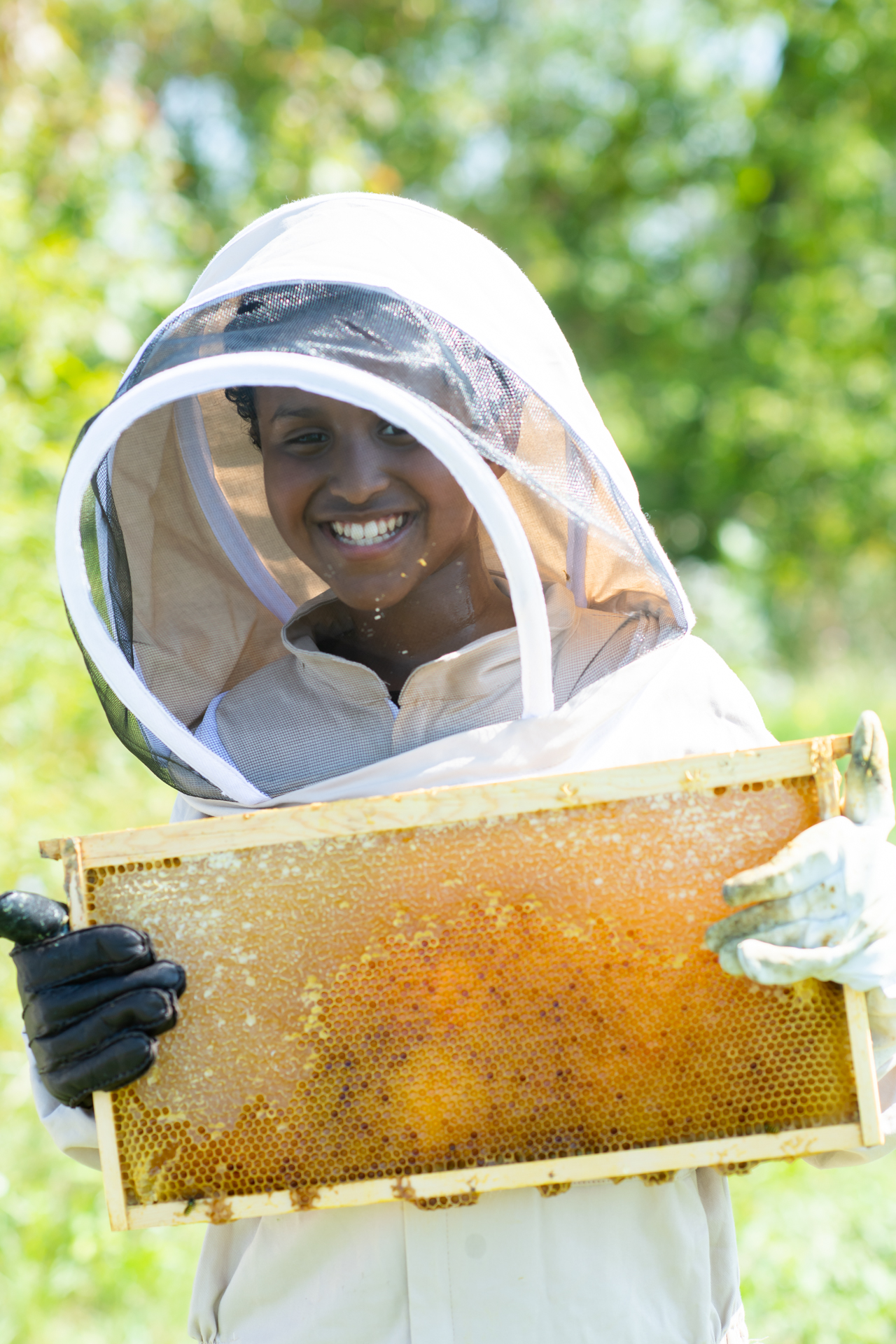
Al-Qur’an community members help harvest.
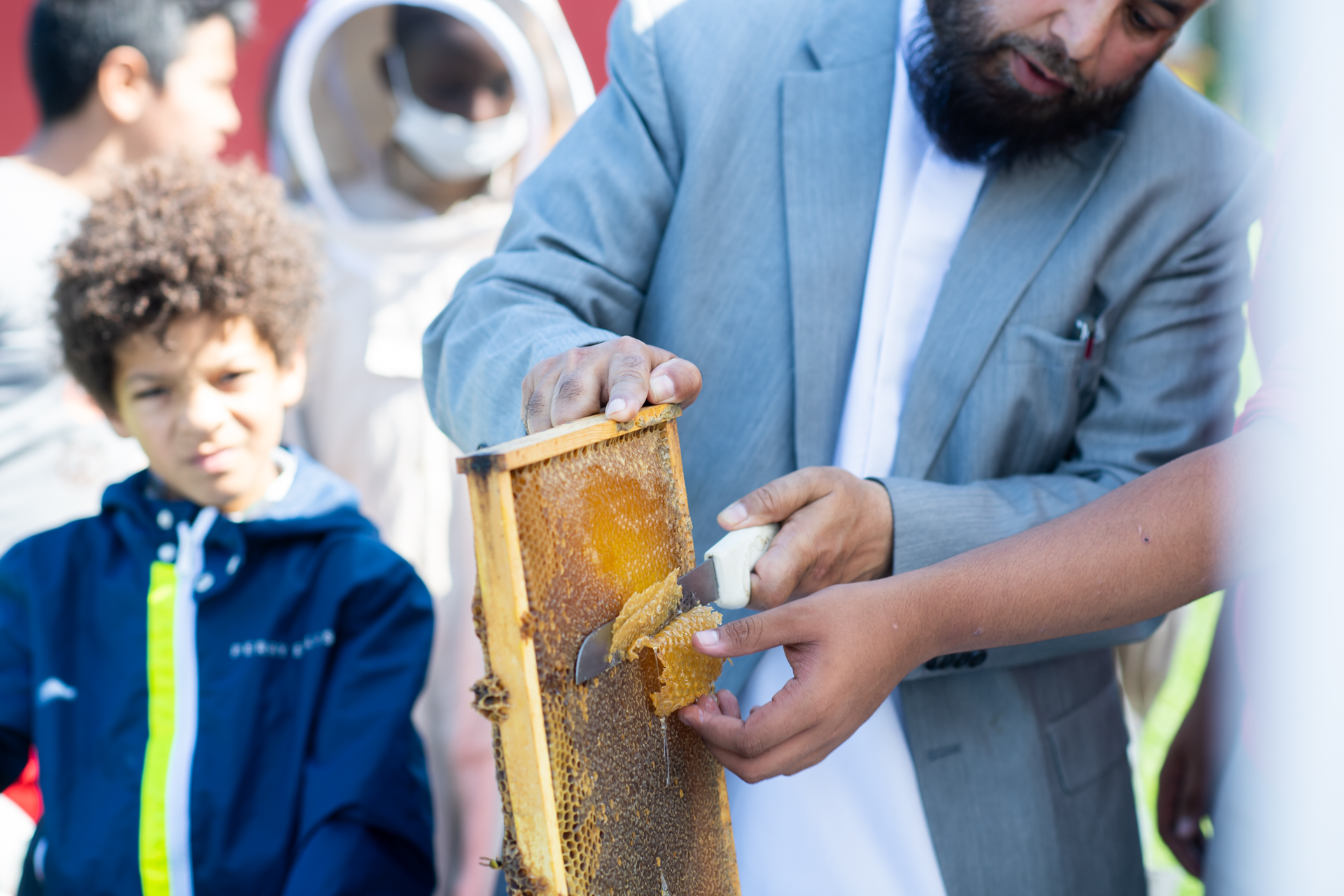
Imam Shafique demonstrates to how honey is harvested from frames filled with golden nectar.
Huda AlKaff, founder and director of Wisconsin Green Muslims, is also a founding member of ISNA’s Green Initiative committee. She has served as a volunteer to mosques in Wisconsin to guide them into becoming more “green,” Imam Shafique said. With her guidance, Masjid Al-Qur’an encouraged the use of reusable water bottles by installing water-refilling stations. They also installed energy-saving light fixtures, smart thermostats and low-flow water fixtures.
Alkaff urged Masjid Al-Qur’an and other mosques to participate in Wisconsin Green Muslims’ Green Ramadan campaign. Later Masjid Al-Qur’an was one of 37 pioneer organizations that participated in 2015 in ISNA’s Green Ramadan Campaign, Alkaff said. Three other Wisconsin Islamic organizations (Islamic Society of Milwaukee, Islamic Center of Madison and The Milwaukee Islamic Dawah Center) also participated.

Ecologist, environmental educator, founder and director of Wisconsin Green Muslims, Huda Alkaff has advocated for environmental justice for more than two decades.
Wisconsin Green Muslims also provided several small grants to Masjid Al-Qur’an and other Wisconsin mosques to help pay for recycling costs and installing water bottle refilling stations as part of the Wisconsin Faith and Solar Initiative, coordinated by Wisconsin Green Muslims, she explained. Alkaff provided digital solar assessment reports to Masjid Al-Qur’an. Imam Shafique said the mosque hopes to pursue using solar energy in the near future.
“Sr. Huda encouraged us last year to eliminate plastic,” Imam Shafique noted. “We slowly started to install water bottle-filling units and provide paper cups rather than plastic water bottles. We provided reusable water bottles to people who came for prayers, especially during Ramadan.”
“Alhamdulillah, Masjid Al-Qur’an with Imam Shafique’s enthusiasm and its volunteers has a vibrant organic vegetable garden, planting fruit trees, six beehives and an ethic toward a zero-waste masjid, InshaAllah,” Alkaff said. “It is an inspiration for many.”

Milwaukee at the forefront
Milwaukee is a great place to go green, said Masjid Al-Quran community member Luqman Bahi. “It is a center point for urban agriculture and earned national recognition with Will Allen’s Growing Power at 55th and Silver Spring,” he said.
Allen, an NBA basketball player, retired at 28 and moved to his wife’s hometown of Milwaukee in 1977. After a career in the corporate world, he retired in 1993 and created Growing Power, a nonprofit organization that modeled 21st century urban agriculture, said its entry in the Encyclopedia of Milwaukee. It operated until 2017. “Through Allen’s respected community food security leadership, Growing Power shaped the national conversation about urban agriculture and food justice as industrial food system solutions,” the entry said.
Masjid Al-Quran’s farm and orchard projects were “inspired by that work,” Br. Luqman said. Some of the people involved in Growing Power visited Masjid Al-Qur’an’s site, “giving advice and helping to get it moving.”
Br. Luqman was involved in Growing Power in the early 2000s, before reverting to Islam. “When I first became Muslim and heard the stories about the sahabah (the companions of Prophet Muhammad), how they were powerful men, some gifted warriors, and they would show such concern about not damaging a fruit tree. And other stories about how all the prophets were shepherds. That’s what gave me confidence to do more (with gardening, something that wasn’t socially sanctioned by some).
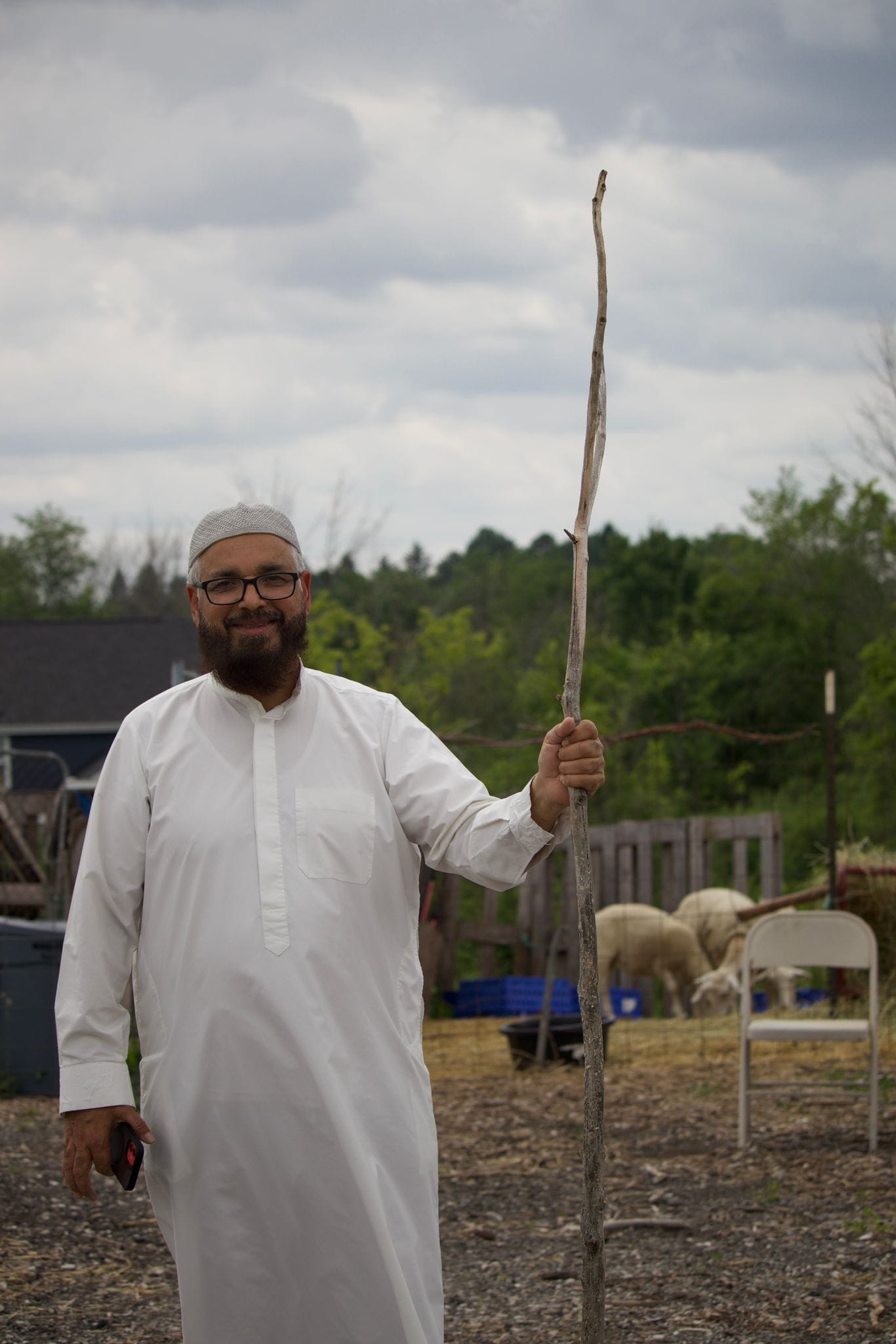
Masjid Al-Qur’an’s imam and religious director Hafiz Muhammad Shafique
“Another inspiration came from Imam Shafique and others who grew up in villages in Pakistan, Palestine and other places. They had such beautiful childhoods around animals and doing chores around their farms, being given tasks at a young age,” Br. Luqman said.
The youth who participate in Masjid Al-Qur’an’s Islamic education programs “get a taste of that tradition, the Muslim tradition of being a shepherd. They really take a look at nature and how Allah created it to interact with us. “I want my children to grow up as if they grew up on a farm,” he said.
Br. Luqman shared the story of his son Imran, who is 12 now. When Imran was two, he didn’t speak in sentences until they had an interesting encounter with a goat.
“I noticed Imran gravitated toward animals. Since I had worked with Will Allen, we stopped by to visit the goats. One day, a goat reached through the fence and bit my jacket. Imran’s face lit up. He pointed and kept saying, ‘The goat bit Baba’s jacket’. All of the sudden, he was speaking in complete sentences. He went and told everybody this story.”
“What we have (at Masjid Al-Qur’an) creates an opportunity for the whole community to spend time together outside and build that relationship with the ummah (the global Islamic community) and nature.
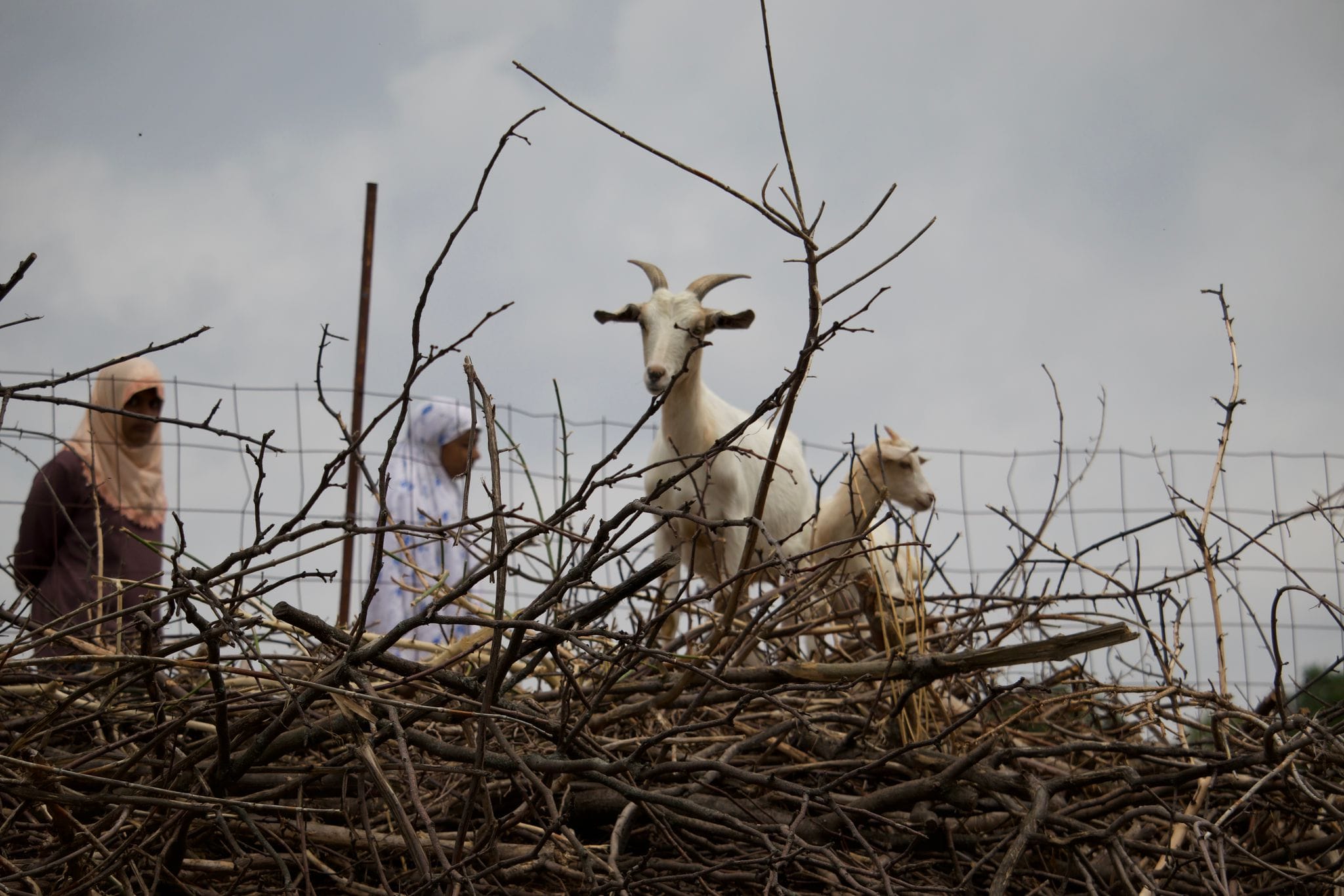
“There’s big energy around (environmentalism) in Milwaukee and I’m glad the Muslim community is recognizing this. As many times as you talk to people about this, sometimes it takes something as superficial as an award, national recognition, to get people energized. I know I plan on trying to win first place for Masjid Al-Quran next year.”
